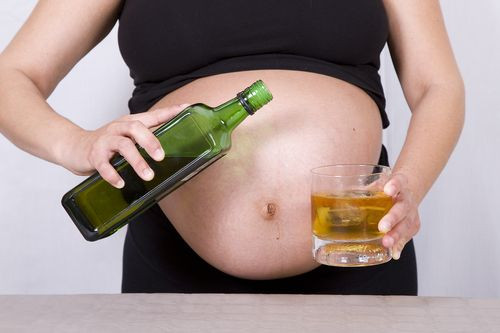International Fetal Alcohol Spectrum Disorders Awareness Day Aims To Help Save Babies From Birth Defects: Don't Drink While You're Pregnant

In the advent of International Fetal Alcohol Spectrum Disorders (FASD) Awareness Day on Sept. 9, the National Institutes of Health emphasizes the importance of abstaining from alcohol consumption while pregnant. As the number one leading cause of birth defects, the NIH released a statement to remind the nation of the life-altering health dangers a mother could burden her child with by drinking while gestating.
There’s a common misconception that it’s safe to drink during certain points in the pregnancy, or that one glass of wine or beer is harmless. It has been almost 30 years since the medical community recognized mothers who drank alcohol while pregnant could result in a wide range of physical and mental disabilities, but still, one in 13 pregnant women reports drinking in the past 30 days and one in six reports binge drinking. Fetal alcohol syndrome can be devastating, which is why a day has been dedicated to spreading the awareness and clearing up the truth for mothers to understand that anything they eat and drink affects the baby.
The NIH’s Alcohol Abuse and Alcoholism branch has supported years of research to reveal the dangers and understand when developmental problems within the womb begin. Babies who are born with fetal alcohol syndrome have been born small and premature, develop problems eating, sleeping, seeing, hearing, learning, paying attention in school, controling their behavior, and may even need medical care through their life. The severity of drinking alcohol while pregnant cannot be underplayed because of the profound confirmed health effects that could follow a child throughout their life.
Every pregnancy is different and unique to the mother’s health, genetic composition, and the baby. According to the NIH, drinking alcohol the first or second month of pregnancy can hurt the baby with irreversible health consequences. The Centers for Disease Control and Prevention backs up the NIH by saying there is no safe level of alcohol to use during pregnancy. If drinking continues throughout the pregnancy, babies are likely to develop fetal alcohol syndrome with characteristic facial features such as a wide set of eyes, smooth ride on the upper lip, and a thin upper lip border. But that’s only the surface, because within the brain lies the possibility of intellectual disabilities, speech and language delays, and poor social skills.
Only certain states, such as Wisconsin or Illinois, permit police to arrest visibly pregnant women who are seen drinking alcohol, while in Tennessee it’s seen as a misdemeanor for child abuse. A bartender or waiter can even deny a pregnant woman from an alcoholic drink if they believe it’s harmful to serve someone a drink, but it’s illegal to discriminate customers from service even if they are pregnant. Imagine being a waiter and feeling morally obligated to deny a pregnant customer a beer, but you can’t because of discrimination laws. Fetal alcohol syndrome is real and fully supported with large bodies of research and diagnoses throughout the years, which is why awareness campaigns are working to strengthen the message of safe pregnancies.
Published by Medicaldaily.com



























